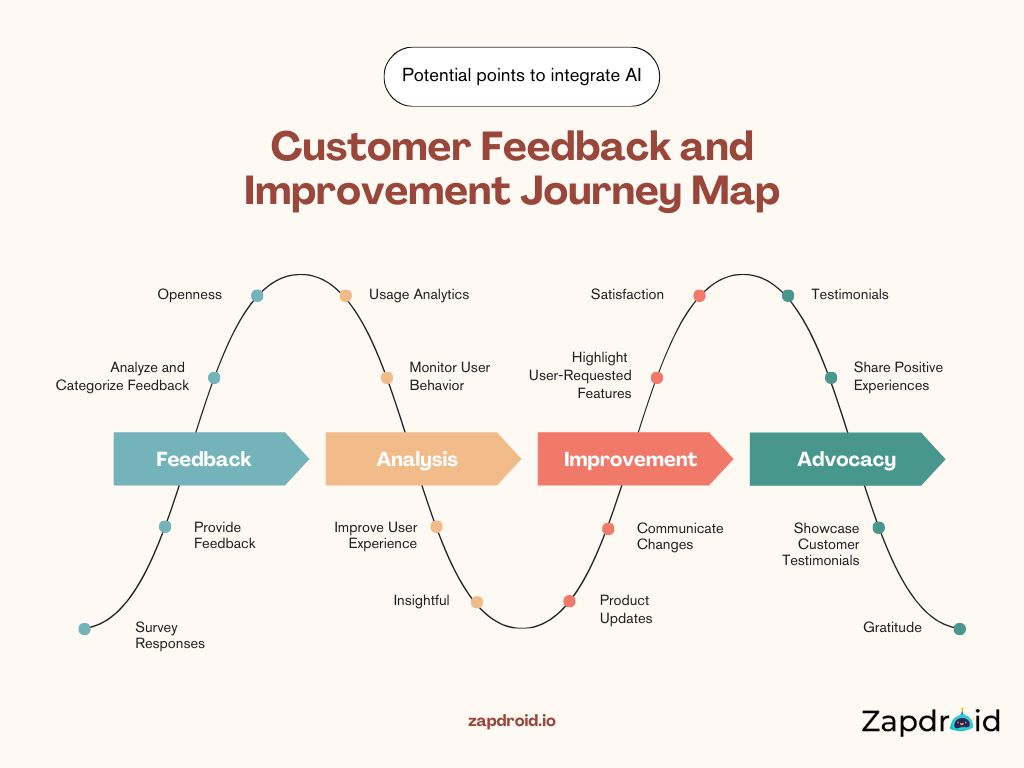AI chatbot for eCommerce

With the launch of advanced AI models, there’s a lot on the line for eCommerce founders. These AI-powered chatbots promise smarter, more personalized customer interactions, but how do they really stack up against the needs of growing online businesses? An eCommerce founder typically spends their time juggling multiple tasks—managing inventory, optimizing marketing campaigns, analyzing customer data, and ensuring a smooth user experience. The promise of AI chatbots is to offload some of these responsibilities by automating customer service, lead generation, and even upselling. Let’s explore how AI can truly transform your business operations and drive growth.
AI in Customer journey
One of the most significant ways AI chatbots can impact eCommerce is through sales. AI chatbots can engage your potential customers at the right time throughout their journey—whether it’s answering pre-purchase questions, providing personalized product recommendations, or offering real-time discounts to close a sale. They excel at tackling cart abandonment, one of the biggest challenges for online stores, by sending timely reminders or exclusive offers to hesitant shoppers, nudging them to complete their purchases. This proactive approach can dramatically reduce cart abandonment rates and drive higher conversions.

But if you are an experienced, seasoned eCommerce entrepreneur, you've probably come across a lot of tools that already do all of this, so what's the difference with AI? The one-word answer is Personalization. Unlike traditional tools, AI doesn’t just automate tasks; it learns from every interaction, enabling it to deliver highly personalized experiences that adapt in real-time. Whether it’s tailoring product recommendations to individual preferences or predicting the optimal time to engage a customer, AI offers a level of precision and intelligence that static tools simply can’t match.
These AI chatbots can take all the information they’ve gathered about a customer—name, email, city they’re from, and more—and generate a personalized response that’s truly engaging. For example, imagine a potential customer from Seattle who added items to their cart but didn’t complete the purchase. Instead of a generic follow-up, the AI could generate something far more captivating:
- Example #1 (AI-generated): Don't let your cart chill like Seattle’s weather!
- Example #2 (templated): Reminder: You have items left in your cart.
The difference is clear: while templated messages feel static and impersonal, AI-generated responses can create a connection by incorporating personal details, making the customer feel seen and valued.
Data-Driven Decision Making: Leveraging AI Insights
AI chatbots aren’t just about engaging with customers—they’re also powerful tools for data-driven decision-making. By analyzing customer interactions, browsing behavior, and purchase history, these AI systems can uncover trends and patterns that might otherwise go unnoticed. For example, AI can predict which products are likely to perform well in the upcoming season or identify customer segments that are more likely to respond to specific promotions. This data-driven approach allows eCommerce businesses to fine-tune their marketing strategies, optimize inventory management, and ultimately make more informed decisions that drive growth.

Before these new AI models came along, business intelligence (BI) or data analysis were limited only to large companies with specialized teams and costly tools. A simple question like, "Which of my products outperformed last winter season?" required a lot of manual effort. More complicated questions, like "Which customer segments are most likely to respond to a summer sale based on their past behavior?" were simply out of reach for most businesses to answer.
Make no mistake—asking some of these right questions can mean the difference between a thriving business and missed opportunities. Identifying which products to promote, understanding the best time to engage customers, and predicting future trends are all crucial for driving sales and staying competitive. Additionally, knowing how much inventory to stock and when to reorder can prevent overstock or stockouts, directly impacting profitability. Without the right tools, though, these insights were often buried under mountains of data, inaccessible to most eCommerce businesses. This is where internal chatbots like Zapdroid come into play, making it very easy to access and analyze this data in real-time. By automating the heavy lifting of data analysis, such AI tools enable businesses of any size to make informed decisions quickly and efficiently.
When connected with your databases, Zapdroid can convert your question into SQL queries or a code snippet that can pull the exact data you need. Whether you’re looking to identify top-selling products from the last winter season or track inventory levels for an upcoming promotion, Zapdroid translates complex queries into actionable insights. This means you no longer need to rely on data experts or spend hours manually sifting through data—AI does the heavy lifting for you.
AI in Customer Support: Enhancing User Experience
While internal tools like Zapdroid help with backend operations, customer-facing AI chatbots play a pivotal role in shaping the user experience. These bots are available 24/7, ready to assist with anything from answering product questions to guiding customers through the checkout process. By providing instant, accurate responses, AI-powered chatbots can reduce wait times, improve satisfaction, and even resolve issues without the need for human intervention. This level of support not only enhances the customer experience but also frees up your team to focus on more complex tasks.
But what about hallucination? In the context of AI, hallucination refers to the phenomenon where an AI model generates a response that seems plausible but is factually incorrect or completely fabricated. For example, a customer-facing bot might confidently provide inaccurate information about a product, shipping details, or even make up non-existent features. This can lead to confusion and frustration for customers, potentially damaging your brand’s reputation.
We at Zapdroid identified this challenge early on. To mitigate the risks of hallucination, we’ve implemented rigorous validation mechanisms that ensure the AI provides accurate and reliable information. By cross-referencing responses with verified data sources, our chatbots minimize the likelihood of generating incorrect answers. Additionally, we’ve built in fallback options where, if the AI isn’t confident in its response, it can escalate the query to a human agent or provide a more general response that avoids potential misinformation.
Other Use Cases: Expanding the Role of AI in eCommerce
Beyond customer support and sales, AI chatbots like Zapdroid can be leveraged for a variety of other use cases in eCommerce. For instance, they can assist with order tracking, providing real-time updates to customers without the need for manual intervention. AI can also be used for post-purchase engagement, such as sending personalized thank-you messages, gathering feedback, or offering tailored product recommendations to encourage repeat business. Additionally, AI chatbots can support marketing campaigns by automating tasks like sending promotional messages, segmenting audiences, and analyzing campaign performance, ensuring that your marketing efforts are both targeted and effective.
The Cost Factor: Investing in AI Chatbots
While the benefits of AI chatbots are clear, it's essential to consider the costs involved. Implementing AI solutions like Zapdroid does require an initial investment, whether it’s integrating the technology, training the system, or maintaining the AI over time. However, compared to the long-term savings in operational costs, reduced dependency on human labor for repetitive tasks, and the potential for increased revenue through better customer engagement, the return on investment can be substantial. For many eCommerce businesses, the cost of not adopting AI could be even higher in terms of lost opportunities and falling behind competitors.
AI chatbots, both customer-facing and internal, are revolutionizing the way eCommerce businesses operate. From driving sales and improving customer support to providing valuable data insights, tools like Zapdroid are making AI accessible and effective for businesses of all sizes. While challenges like hallucination need careful handling, the benefits of integrating AI far outweigh the risks. As the technology continues to evolve, those who embrace AI chatbots today will be better positioned to thrive in the competitive eCommerce landscape of tomorrow.

